De Canadese schrijfster Gabrielle Roy werd geboren op 22 maart 1909 in Saint Boniface, Manitoba. Zie ook mijn blog van 22 maart 2007 en ook mijn blog van 22 maart 2009 en ook mijn blog van 22 maart 2010.
Uit: Children of My Heart
„Now I recognized him: an immigrant from the Abruzzi who had recently come to our town. As yet unable to find work in his own trade of upholsterer, he was doing odd jobs here and there. This was why I had seen him one day in our neighbourhood, digging up a patch of ground. I remembered that his little son has been with him, trying to help, that the two never stopped talking as they worked, no doubt spurring each other on, and that this murmur in a foreign tongue, at our fields’ edge, had seemed to have a special charm.
I went over to them with the very best smile I could muster. As I came near, the child cried out in terror and clung even more desperately to his father, who trembled on contact. I could see that he wouldn’t be much help. On the contrary, with his caresses and soft words he did nothing but keep alive the hope that he might weaken. And in fact the father began to plead with me. Since the boy was so unhappy, wouldn’t it be better to take him home just this once, and try again this afternoon or tomorrow morning, when he’d have time to explain what a school was.
I saw them hanging on my decision, and took my courage in my two hands: “No, when you have to make the break, it doesn’t help to wait.”
The father lowered his eyes, obliged to admit I was right. Even between the two of us we had trouble detaching the child; as soon as we loosened the grip of one hand it slipped away to grasp another handful of the father’s clothing. The odd thing was that while he continued to cling to his father he was furious with him for taking my side, and through his tears and hiccups was calling him a heartless wretch, or words to that effect.“
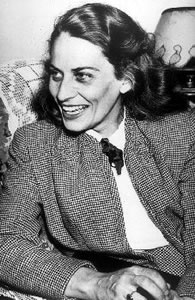
Gabrielle Roy (22 maart 1909 – 13 juli 1983)
De Tsjechische dichter en schrijver Ludvík Kundera werd geboren op 22 maart 1920 in Brünn. Zie ook mijn blog van 22 maart 2007.en ook mijn blog van 22 maart 2008 en ook mijn blog van 22 maart 2010.
Nachricht über den Tod André Bretons
8.36 Bahnhof Frankfurt
niemand streut
Seesterne
großes Händchen
kleines Händchen
Bündel Koffer
leere Telefonzelle
leere Bank
niemand schüttelt
trockne Königskerzen
zerknüllter Zeitungen raus
gegenüber Zugeinfahrt
Zugluft blättert
in Telefonbüchern
Drähte fleckiges Dach
niemand schält
Kiefernrinde ab
amerikanischer Offizier
dick und bebrillt
mit Frau und vier Töchtern
dicken und bebrillten
Signale weder auf rot
noch auf grün
niemand sprengt
mit rostigen Tannennadeln
8.50 Abfahrtspfiff
leerer Bahnsteig
nur ein einziges einsames Mädchen
winkt einem alten Mann
der abfährt
niemand klopft
mit Schlegeln Sonnenblumen.
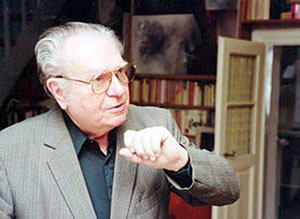
Ludvík Kundera (22 maart 1920 – 17 augustus 2010)
De Franse dichter Léon Deubel werd geboren op 22 maart 1879 in Belfort. Zie ook mijn blog van 22 maart 2007.en ook mijn blog van 22 maart 2008 en ook mijn blog van 22 maart 2010.
Ma Souffrance
Ma souffrance n’est pas de celles qu’on diffame
Ni de celles que trompe un facile plaisir ;
Elle a le front de ceux qui vivent sans désir
Et ne s’endort jamais sur l’épaule des femmes.
L’orgueil qui la nourrit sans cesse de sa flamme
Et fait luire à ses yeux tous les trésors d’Ophir
L’exalte à des sommets pénibles à gravir
Qui menace l’azur natal qu’elle réclame.
Mais les plus fiers essors sont captifs de Demain,
Et farouche, impuissant et cruel, de ces mains
Frémissantes encor d’avoir tenue la Lyre,
J’offre au ciel fulgurant qui châtia Sodome,
Et voua Prométhée à l’éternel martyre,
L’invincible douleur de ne rester qu’un homme
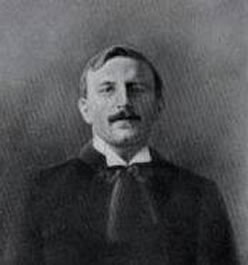
Léon Deubel (22 maart 1879 – 4 juni 1913)
De Engelse schrijver Edward Moore werd geboren in Abingdon, Berkshire op 22 maart 1712. Zie ook mijn blog van 22 maart 2009 en ook mijn blog van 22 maart 2010.
Uit: The Gamester
„Mrs. Bev. And is. I have no fear of his affections. Would I knew that he were safe!
Char. From ruin and his companions. But that’s impossible. His poor little boy too! What must become of Him?
Mrs. Bev. Why, want shall teach him industry. From his father’s mistakes he shall learn prudence, and from his mother’s resignation, patience. Poverty has no such terrors in it as you imagine. There’s no condition of life, sickness and pain excepted, where happiness is excluded. The needy peasant, who rises early to his labour, enjoys more welcome rest at night for’t. His bread is sweeter to him; his home happier; his family dearer; his enjoyments surer. The sun that rouses him in the morning, sets in the evening to release him. All situations have their comforts, if sweet contentment dwell in the heart. But my poor Beverley has none. The thought of having ruined those he loves, is misery for ever to him. Would I could ease his mind of That!
Char. If He alone were ruined, ’twere just he should be punished. He is my brother, ’tis true; but when I think of what he has done; of the fortune You brought him; of his own large estate too, squandered away upon this vilest of passions, and among the vilest of wretches! O! I have no patience! My own little fortune is untouched, he says: would I were sure on’t!“
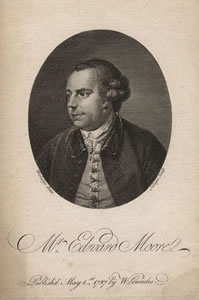
Edward Moore (22 maart 1712 – 1 maart 1757)
Gravure door James Neagle
De Tsjechische schrijver Karel Poláček werd geboren op 22 maart 1892 in Reichenau. Zie ook mijn blog van 22 maart 2007.
Uit: We Were a Handful (Vertaald door Mark Corner)
„Now I go round to the Zilvars, the people from the poorhouse. That’s the most fabulous place of all, but I don’t say anything about it at home because they’d only be against it. Mr. Zilvar was in the Great War, during which he was wounded by enemy gunfire. So he goes begging from house to house and has a wooden leg. I’d like to have a leg like that and I long for one so much that it gives me dreams in which I go around with a wooden leg that makes a heavy “Plonk! Plonk!” sound and people come running out of their homes, each one of them marvelling at my wooden leg, with me feeling very proud. I’ve set my heart on mending my ways, and when they’re mended I’ll ask the family to give me a wooden leg for Christmas, and then the lads will really have something to see.
The poorhouse also has some ladies who go begging and they spend every evening counting what they’ve been able to beg during the day, and then they get into arguments. Mr. Zilvar can’t stand it when they argue a lot. He unfastens his leg and flings it at the old hags and then they stop arguing. Zilvar boasted that his pa’s the chief beggar because he gets the most money and so the others have to listen to what he says. He coughs a lot in the night because of a blood clot. He told me this and was very proud of it.“
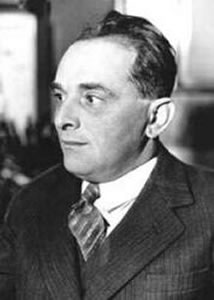
Karel Poláček (22 maart 1892 – 19 oktober 1944)
De Engelse schrijver Nicholas Monsarrat werd geboren op 22 maart 1910 in Liverpool. Zie ook mijn blog van 22 maart 2009.
Uit: H.M. Corvette
“Therell be no admirals in this joint,” said M. to me. “It’s expecting too much altogether.”
There seemed to be almost everything else: above all, there was a stupefying row going on
the whole time, with everyone contributing according to his means: most of it was rivetting, but even small boys with nothing else to do would he idly hammering on sheets of iron as they talked. (I daresay they were training for the more responsible jobs: I swear they deserved them.) To make ourselves heard at all we had to shout: and it Is foolish (and unhelpful) to shout “What a horrible noise!” so we mostly kept silent and looked about for our quarry*
There was, as we had suspected, no admiral, but instead a helpful works-foreman who directed us to a hut labelled, dauntingly, NAVAL OFFICERS KEEP OUT; and installed there we
found an R.N.V.R. officer, with a red face and a square chin, dressed in a working-suit which made us look and feel like the First and Second Dudes in a tastelessly lavish production.
He had two stripes to our one, and was in fact the First Lieutenant. After we had announced ourselves he looked us over carefully, from a good many angles : it was difficult to tell which, if any, he liked.
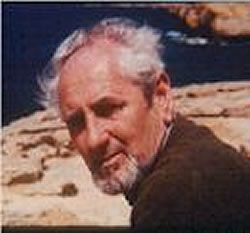
Nicholas Monsarrat (22 maart 1910 – 8 augustus 1979)
De Duitse schrijver en publicist Hans Grimm werd op 22 maart 1875 geboren in Wiesbaden. Zie ook mijn blog van 22 maart 2007.en ook mijn blog van 22 maart 2008 en ook mijn blog van 22 maart 2010
Uit: Grimm ohne Glocken (Studie van Manfred Franke over Hans Grimm)
„Volk ohne Raum” hatte Grimm so bekannt gemacht, dass er 1928 zu einem von ihm angestrebten Gespräch bei Hitler vorgelassen wurde. Zu denen, die außerdem mit Grimm zusammenkamen, gehörten neben anderen der Politiker Alfred Hugenberg, der Journalist Paul Fechter, der Schriftsteller Arnolt Bronnen sowie der Diplomat Ulrich von Hassell, in späteren Jahren führendes Mitglied des Widerstands. Als nach Inkrafttreten des „Gesetzes zur Wiederherstellung des Berufsbeamtentums” (7. 4. 1933) Grimms ehemaliger Vorgesetzter in der OHL, Paul Landau, seiner jüdischen Herkunft wegen die Existenzgrundlage zu verlieren drohte, wandte er sich an Hans Grimm. Er und der Balladendichter Börries von Münchhausen versuchten Landau zu helfen, letztlich vergeblich. Andererseits hat Grimm kaum eine Gelegenheit ausgelassen, seine Distanz zu Juden und besonders zu jüdischen Kollegen zu betonen. Nach 1945 verstieg er sich sogar dazu, die Anzahl der ermordeten Juden schlichtweg in Abrede zu stellen.
Grimm konnte für sich geltend machen, nie „Pg.” gewesen zu sein. An Hitler freilich hielt er mit Einschränkungen fest. „Wenn wir überhaupt eine nationale Zukunft haben wollen”, so Grimm, dürfe „der Nationalsozialismus nicht verloren gehen” und „müsse nur wieder sauber gemacht werden.”
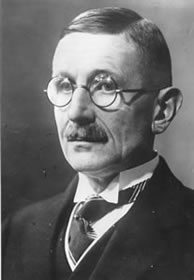
Hans Grimm (22 maart 1875 – 27 september 1959)
